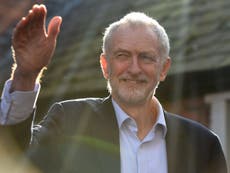This is why Corbyn's Labour has utterly failed to put the antisemitism crisis to bed
The leader's affronted blundering has fuelled a divide at the very top of the party

Labour MPs saw the suspension of Chris Williamson last week as a major success in the battle against antisemitism.
“We got there in the end,” one told me, after months of campaigning for action to be taken against the Derby North MP, who had consistently supported people suspended by the party over alleged anti-Jewish abuse.
But it was in reality just another episode in a saga that Labour appears completely unable to address. Political parties are often hit by scandals. Rarely do they drag on for three years.
With Williamson, party bosses relented and suspended the MP only after a joint letter from usually loyal MPs, furious condemnation from senior parliamentarians and the risk of further damaging defections. They had ignored for many months the pleas of Jewish groups, who had been demanding action against him with mounting anger.
It was a prime example of how concerns about anti-Jewish behaviour have so often been overlooked or dismissed. The implications of that keep coming. Today, the UK’s equality watchdog said it would investigate whether Labour had unlawfully discriminated against people because of their religious beliefs. Complaints were submitted by the Campaign Against Antisemitism and the Jewish Labour Movement (JLM), Labour’s only Jewish affiliate, which voted to “stay and fight” after deliberating whether to sever ties with the party.
But why is a party that champions equality and tolerance so unable to prove it applies those values towards Jews?
The first problem is that, when it comes to antisemitism, the Labour Party remains gripped by angry denialism. Too many in the party believe there is no problem at all, and too many more claim the issue is much smaller and more marginal than it really is.
There remains a staggeringly widespread insistence that, whatever British Jews are saying, loudly and repeatedly and increasingly angrily, about the scale of Labour’s antisemitism problem, they are wrong.
A poll of Labour members last year found that 30 per cent thought antisemitism was not a genuine problem, while just 19 per cent thought it was a genuine problem that needed addressing. And if you watch the video that led to Williamson’s suspension, the rapturous applause from Momentum members is more of a worry than the words of one maverick MP.
This defensive mindset is one of the biggest barriers to Labour tackling what is a real and sizeable problem. And yet, how can the party’s leadership get a grip on it this when for so long it was saying the same thing?
The shadow home secretary, Diane Abbott, has previously described concerns about antisemitism as smears. Len McCluskey, leader of Labour’s biggest union donor, Unite, called them “mood music”. One of Jeremy Corbyn’s senior advisers, Andrew Murray, suggested it was a disgraceful smear campaign. Media outriders for the Labour leadership have continually played down the issue. Given their previous comments, it hardly sounds authentic when party leaders now say there is real problem.
Behind the steady stream of denial about the scale of antisemitism lies a disturbing double standard. For unlike with the victims of any other type of prejudice, Jews in the Labour Party are not allowed to define what is or is not antisemitism. Instead, they are constantly insulted, shouted down, and told they are mistaken when it comes to their own suffering.
With no other group would so many on the left treat victims how they do Jews. They would not sign petitions and write letters and pass motions to tell women what is or isn’t sexism. They would not dream of giving angry speeches and holding meetings to denounce BAME people’s claims about racism.
But with Jews it is different. When Jews talk about antisemitism in Labour they are told, time after time, that at best they are wrong, or stupid, and at worst that they are part of some secret, sinister plot to undermine Jeremy Corbyn.
Just last week, in response to the Williamson row, Sheffield Hallam Constituency Labour Party (CLP) passed a motion insisting criticism of the MP was a deliberate attempt – by Jews and their supporters, we can only presume – to ruin the reputation of Chris Williamson and Jeremy Corbyn. There have been similar moves in Hackney North and Streatham.
When Jews are treated so differently to other minority groups, it is impossible to see it as anything other than rooted in antisemitism. There has long been an implicit view among parts of the hard left that Jews are not a disadvantaged minority – not really. Not in the way that applies to women, or BAME people, or Muslims, or immigrants, or gay people or disabled people or virtually every other minority.
Instead, too many people on the left unthinkingly link Jews to the things they hate most: capitalism and, because of Israel, Western colonialism. This is one of the most common examples of antisemitism.
Rather than express solidarity with what remains the most oppressed religious group in human history, a disturbing number of Labour supporters instead share social media posts about Jewish influence in the media, Rothschild money or Israel’s secret power over world affairs. Jewish members report the same comments coming up time and time again in party meetings.
Part of the problem is that many of those perpetuating anti-Jewish tropes often do not realise they are being antisemitic. Antisemitism is deeply complex, and some people do not understand the disturbing nature of the tropes they repeat until the genocidal history of their claims is pointed out.
Education on antisemitism and its various forms therefore needs to be a fundamental part of the solution. But it will only work if people understand they are part of a problem rather than furiously denying that there is one. There is depressingly little to suggest that is the case.
Change will instead need to be driven by a party leadership that has so far spectacularly failed to address the problem. Team Corbyn’s failure to get a grip on the issue stems partly from the tribalism that now dominates Labour politics.
The Labour leader and many of his closest allies are from a part of the left that instinctively divides people into friends and foes and sees issues as battles to be won, not dilemmas to be resolved. There is no natural tendency to reach out, to engage and compromise.
This creates an instinctive tendency to stand by friends and allies even if the face of overwhelming reasons not to. Numerous cases have seen perpetrators inexplicably let off with only a warning, and the leadership has been unable to shift accusations that it has quietly intervened to protect allies. Despite an ever-growing list of complaints from Jewish groups about Williamson, Corbyn insisted just a month ago that he was a very good, very effective Labour MP.
Some say this stems from the Labour leader’s personal loyalty to his supporters. One shadow cabinet minister put it to me last week: “Jeremy is just too nice to his friends. They could walk up and kick him, say ‘Sorry Jeremy, it was an involuntary leg movement’ and he’d say ‘oh, don’t worry’.”
Others offer a less generous but perhaps more insightful explanation. Some who know Corbyn well say that anti-racism and a fierce belief in equality are so central to his self-identity that it has become a blind spot for him: that the very genuine hurt, anger and offence he feels at claims he is antisemitic or tolerates antisemitism prevent him from thinking deeply or effectively about what might be creating that impression.
His response is instead highly defensive, and often hostile. As Emily Thornberry put it last month, Corbyn is often simply too upset to properly respond to antisemitism. You can see it in almost every broadcast interview, where he bristles whenever the issue is mentioned.
This defensiveness is not limited to the Labour leader himself. Those who work closely with his team frequently describe a bunker mentality. The “us against the world” mindset that saw the insurgent backbencher take on and defeat the establishment candidates has, they say, never really gone away. It helps explain why the response to criticism over antisemitism has too often been defensive rather than pro-active, with the party responding only when forced to and continually missing clear opportunities to make the issue go away.
This has frustrated some MPs who are naturally sympathetic to the Corbyn project. John McDonnell has been privately furious at how the antisemitism row has been handled. He has frequently adopted a more conciliatory approach and privately urged Team Corbyn to do more to put the issue to bed, deeply aware that their failure is diminishing his chances of becoming Chancellor.
In this way, the antisemitism row is a battleground for a deeper divide in Labour’s top team: between those for whom the priority is maintaining strong loyalty to allies and winning internal battles, and those who are willing to sacrifice that agenda for the sake of securing genuine power. On one side is McDonnell; on the other, some of Corbyn’s closest advisers.
The party’s attempt to recruit Lord Falconer – hardly a natural ally of the Labour leadership – to sort out the antisemitism row is a good starting point for change, but the party must now give him the freedom to carry out his inquiry and take whatever action is needed.
No longer can anyone credibly claim that antisemitism in Labour is limited to a few lone individuals. When some MPs claim the party is institutionally antisemitic, they mean the problem has become entrenched across the party and that there is little sign of it going away. It is increasingly hard to argue with that.
What is even more pervasive, though, is the continued denial that the problem is real and significant, not some elaborately concocted conspiracy. Labour has to change to finally get a grip on the scandal that has engulfed it for years. It will not be able to do so until it finally begins to admit and understand the scale of the problem it faces.






Join our commenting forum
Join thought-provoking conversations, follow other Independent readers and see their replies